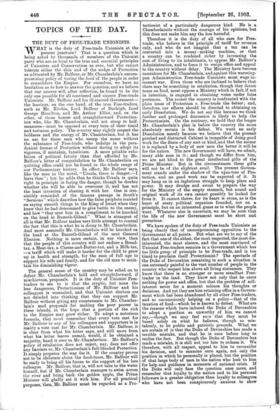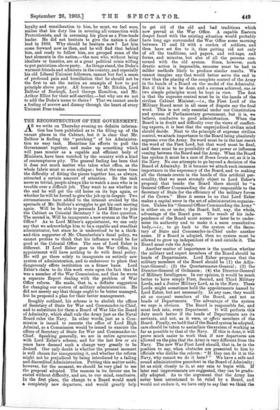doxical license of Protection without daring to adopt its it
is replaced by a body of new men the better it will be vigorous, if mistaken, fanaticism. A more pitiable exhi- for the nation. The new Government will have, we admit, bition of political fatuity than that afforded by Mr. many able men in it ; and though we differ from him, Balfour's letter of congratulation to Mr. Chamberlain on we are not blind to the great intellectual gifts of the quitting office could not be found in the whole range of Prime Minister. But in the circumstances these gifts our Parliamentary history. In effect, Mr. Balfour says, will not be of the slightest avail. The present Govern. like the man in the novel, "Ursula, there is danger,—I ment stands under the shadow of the upas-tree of Pro- leave thee " ; but he adds that he thinks Ursula is quite tection, and no good work can be expected of it. It right in principle in facing the danger, though he doubts may hang on in an inglorious struggle to keep place and. whether she will be able to overcome it, and has not power. It may drudge and sweat to prepare the way the least intention of sharing it with her. One is irre- for the Ministry of the empty stomach, but sound and sistibly reminded of the famous passage. in South's original work of its own cannot possibly be looked for "Sermons" which describes how the false prophets insisted from it. It cannot thrive, for its heart is stone, as is the on saying smooth things to the King of Israel when they heart of every political organism founded, not on a knew that he had determined to give battle to the enemy, principle, but on an interested guess as to what the people and how "they sent him in a compliment to be knocked want. Whatever else is uncertain, we may be sure that on rthe head at Ramoth-Gilead." What is strangest of the life of the new Government must be short and all is that Mr. Balfour makes very little attempt to conceal precarious.
the fact that this is what he is doing to Mr. Chamberlain. We have spoken of the duty of Free-trade Unionists as And most assuredly Mr. Chamberlain will be knocked on being clearly that of uncompromising opposition to the the head at the Ramoth-Gilead of the next General Government at all points. But what are we to say of the Election. Nothing is more certain, in our view, than fact that one of the ablest, the most respected, the most dis- that the people of this country will not endure a Bread- interested, the most sincere, and the most convinced of tax, a Meat-tax, a Cheese-and-Butter-tax, and a Milk-tax, Unionist Free-traders remains in a Government which has —a tariff which will make it harder for the child to grow too little grasp of principle to be Free-trade, and is too up in health and strength, for the man of full age to timid to proclaim itself Protectionist ? The spectacle of support his wife and family, and for the old man to main- the Duke of Devonshire remaining in such a situation is tam n his diminishing vigour. one extremely painful to the vast number of people in the The general sense of -the country may be relied on to country who respect him above all living statesmen. They defeat Mr. Chamberlain's bold and straightforward, if know that there is no stronger or more steadfast Free- mischievous, proposals. It is the duty of Unionist Free_ trader in the land. They know not only that he cares traders to see to it that the cryptic, but none the nothing for power and office, but that the problem of self- less dangerous, Protectionism of Mr. Balfour and his interest never for a moment colours his thoughts or colleagues is unmasked, and that Unionist electors are decisions. And yet they see him retaining office in a Govern- not deluded into thinking that they can support Mr. ment which has been abandoned by all other Free-traders, Balfour without giving any countenance to Mr. Chamber- and. so unconsciously helping on a policy—that of the lain's mad proposals for making the poor poorer in taxation of food—which he is known to detest. What are these islands, in the hope that a portion of the rich the reasons which have induced the Duke of Devonshire in the Empire may grow richer. To adopt a notorious to adopt a position so unworthy of him we cannot formula, they must remember that • every vote cast for say,—though we may feel sure that they must be Mr. Balfour or any of his colleagues and supporters is in based solely on what he believes, though so mis- reality a vote cast for Mr. Chamberlain. Mr. Balfour, it takenly, to be public and patriotic grounds. What we is clear from what his letter says, and still more from are certain of is that the Duke of Devonshire has made a what his letter leaves unsaid, would, if he obtained a terrible mistake, and that he is sure before long to majority, hand it over to Mr. Chamberlain. Mr. Balfour's realise the fact. But though the Duke of Devonshire has policy of retaliation does not reject, nay, does not offer made a mistake, it is still not too late to redeem it. We any barriers to, Mr. Chamberlain's full-blooded Protection. therefore, with all respect, appeal to him to reconsider It simply prepares the way for it. If the country proves his decision, and to examine once again, not only the not to be obdurate abolit the food-taxes, Mr. Balfour will position in which he personally is placed, but the position be ready to bring all his forces to the support of his late of that large body of men in the nation who look to him colleague. Mr. Balfour, that is, will not take to the water for help and guidance in moments of national crisis. If himself, but if Mr. Chamberlain manages to swim across the Duke will only face the question once more, and the river and bring back the golden apple, the Prime remember that loyalty to the nation and to his personal Minister will gladly eat it with him. For all practical followers is a greater obligation than loyalty to colleagues purposes, then, Mr. Balfour must be regarded as a Pro- who have not been conspicuously anxious to show tectionist of a particularly dangerous kind. He is . s TOPICS OF THE DAY. Chamberlainite without the courage of his opinions, but this does not make him any the less harmful.
Therefore it is the duty of all who care for Free.. THE DUTY OF FREE-TRADE UNIONISTS. trade, who believe in the principle of tariff for revenue, WHAT is the duty of Free-trade Unionists at the only, and who do not imagine that a tax can be present juncture ? That is a question which is converted into a money - making machine, or that being asked by thousands of members of the Unionist a country can be rendered richer by increasing the party who are as loyal to the true and essential principles cost of living to its inhabitants, to oppose Mr. Balfour's of Unionism and Conservatism as ever, but who cannot Administration, and to force it to resign office and appeal tolerate either the thin end of the wedge of Protection to the country without delay. The Ministry have become as advocated by Mr. Balfour, or Mr. Chamberlain's uncom- caretakers for Mr. Chamberlain, and against this warming. promising policy of taxing the food of the people in order pan Administration Free-trade Unionists must wage in- to consolidate the Empire. For ourselves, we have no cessant war. Even those who are inclined to believe that hesitation as to how to answer the question, and we believe there may be something in retaliation, though they detest that our answer will, after reflection, be found to be the taxes on food, must oppose a Ministry which in fact, if not only one possible for all convinced and sincere Free-trade in intention, is engaged in. obtaining votes under false Unionists. Mr. Balfour and his ill-starred Government-- pretences. The sooner the country is confronted with the the leavings, on the one hand, of the true Free-traders, plain issue of Protection v. Free-trade the better ; and, such as Mr. Ritchie, Lord Balfour of Burleigh, Lord therefore, our efforts should be directed to obtaining an George Hamilton, and Mr. Arthur Elliot, and, on the early Dissolution. We do not say this because we think other, of those honest and straightforward Protection- further and prolonged discussion is likely to help the ists who, like Mr. Chamberlain, will not stoop to half- Protectionists. On the contrary, we hold that the longer measures—must be opposed at every turn of their timid Mr. Chamberlain's plan is before the country the more and tortuous policy. The country may rightly respect the absolutely certain is his defeat. We want an early boldness and the energy of Mr. Chamberlain, but it has Dissolution merely because we believe that the present no use for those men who usurp the name without patched and distracted Cabinet is incapable of doing good the substance of Free-trade, who indulge in the para- work for the State of any sort or kind, and that the sooner loyalty and consideration to him, he must, we feel sure, realise that his duty lies in severing all connection with Protectionists, and in assuming his place as a Free-trade leader. He did not hesitate to give the nation a clear lead in 1886. Why should he hesitate now ? Let him come forward now as then, and he will find that behind him, and ready to follow him, are grouped some of the best elements in the nation,—the men who, without being idealists or fanatics, are at a great political crisis willing to put patriotism above party. As thmgs stand, the Duke's warmest friends and admirers in the country, and especially his old Liberal Unionist followers, cannot but feel a sense of profound pain and humiliation that he should not be the first to set the nation an example of how to put principle above party. All honour to Mr. Ritchie, Lord Balfour of Burleigh, Lord George Hamilton, and Mr. Arthur Elliot for their self-sacrifice,—but why are we not to add the Duke's name to theirs ? That we cannot sends a feeling of sorrow and dismay through the heart of every Unionist Free-trader.















































 Previous page
Previous page